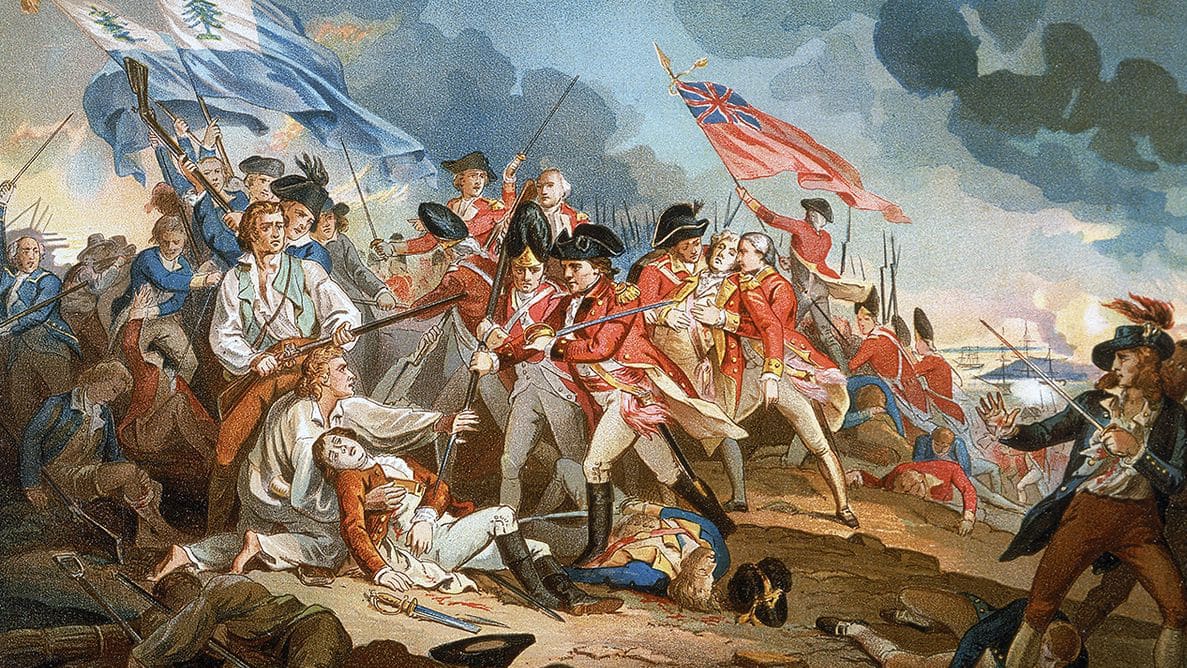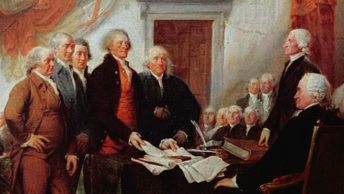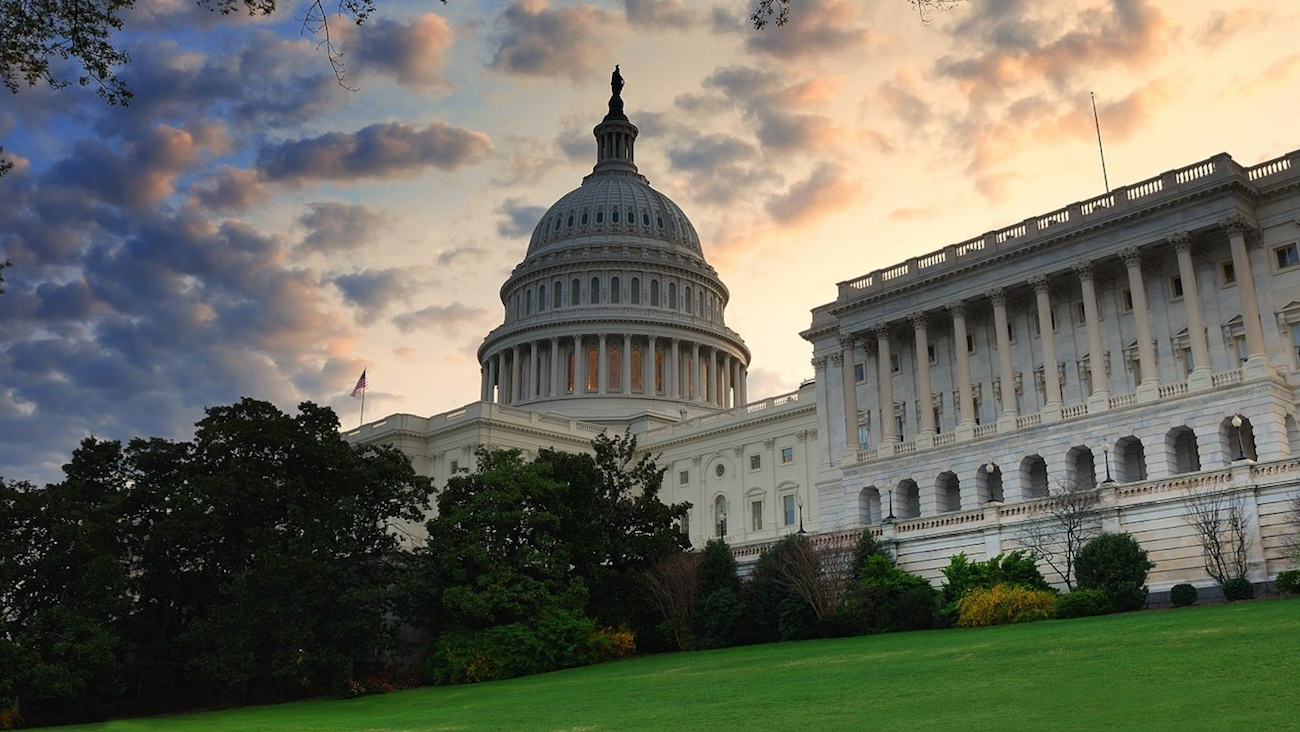On July 4, 1776, American patriots proclaimed the Declaration of Independence. This document and subsequent events changed the history of the world. The Declaration of Independence expressed the inalienable rights of all men to “life, liberty, and the pursuit of happiness.” These rights, endowed by their Creator, could not be taken away, because each individual was born with these rights in nature. People formed governments to protect these rights and to maintain a well-ordered society so people could act upon these rights.
The signers of the Declaration of Independence and those who fought for independence were called “patriots.” Being an American patriot was a badge of honor for these men. They were willing to die for their belief in their inalienable and natural rights to pursue life and liberty. Patriotism is not necessarily the same as nationalism, but the two are intertwined. The patriots who signed the Declaration of Independence envisioned a new nation being founded, the United States of America. It was to be a truly exceptional nation in that the people were sovereign, not a king, queen, aristocracy or political clique. Throughout the 19th century through the mid-20th century, American patriotism expressed itself in a commonly held belief that America was a truly exceptional nation.
Patriotism meant a willingness to defend the nation for the preservation of the Republic. Patriotism expressed itself in a unique nationalism that recognized we were a united people who came from many different countries, cultures and races. Our political culture allowed religious and political differences to be freely expressed and protected by the U.S. Constitution and a tradition and custom of political liberty and economic freedom.
Thus it is discouraging to read that recent surveys reveal that only 52 percent of Americans are “extremely proud” to be American. A closer look at the numbers proves less distressing, but gives rise to concern as well. Surveys show a deep partisan and religious divide on the meaning of patriotism in America today. This loss of patriotism among the young needs to be addressed. Without a patriotic people, no nation can survive for long.
The Partisan Gap
Recent surveys by Gallup, the American Enterprise Institute, and Pew Research show a decline in percentages of Americans who declare themselves “extremely proud” of being American. Even so, a sizeable majority of Americans remain proud– extremely or moderately–to be American. The least patriotic are liberals and young adults. The annual Gallup survey, released in July 2016, shows the lowest percentage of Americans who are “extremely proud” to be American since the poll began 16 years ago.
The vast majority of U.S. adults indicate that they are still proud to be Americans. The greatest decline in those describing themselves as “extremely” or “very” proud to be Americans occurred with Democrats and liberals, according to a March 2017 Gallup poll. Republicans and independents showed little decline in their patriotic expression. Ninety-two percent of Republicans said they were “extremely” or “very” proud to be Americans, compared with only 67 percent of Democrats, who were down 11 points from a year earlier.
Equally important is that the party gap in patriotism between Republicans and Democrats is the highest in Gallup records. The party gap was 21 points in January 2007. Today this gap stands at 25 percent. Conservatives and Republicans have been much steadier in their expression of patriotism. Their patriotic feelings remained generally the same throughout the Bush, Obama and Trump administrations. Liberals on average tend to allow politics to determine how they feel about their country. When Obama was elected, Republicans still remained extremely patriotic; the left’s feelings toward their country have fluctuated depending on who is president at the time, a Democrat or Republican.
Obviously, much of this partisan gap, and the decline in patriotism, are due to Democrats’ negative feelings toward President Donald Trump. Democrats simply cannot recognize that Trump defeated their candidate, Hillary Clinton, in a fair and square election in 2016. For many Democrats, Trump’s election has affected how they see themselves as American.
Democratic leadership, by pursuing a scorched- earth policy of opposing everything Trump does– from asking for two scoops of ice cream at White House dinners to trying to reform health care and the tax system to calling for rebuilding the nation’s deteriorating infrastructure–are playing with fire. Overall, Americans, Republicans and Democrats, conservatives and liberals, remain patriotic. Most are proud to be Americans, and denunciations by leftist and anarchist extremists of Trump’s America as “fascist America” can backfire on the Democrats. This backlash will only be heightened if Democrats get the blame for violence on the streets and the shooting of Republican politicians, as occurred in June in Alexandria, Virginia when Republican congressmen were targeted by an especially deranged Bernie Sanders supporter.
Decline in American Patriotism
While Americans express strong patriotic feeling, with the majority saying they are extremely proud to be Americans, America ranks only in the middle of the list of nations expressing high levels of patriotism. Ranking highest in the patriotism scale, as measured by “extremely proud,” is Qatar, with 98 percent of its people extremely proud of their country. Midway down on the list of some ninety countries stands America. More distressing is that the United States has fallen to mid-levels in this patriotism thermometer since the World Values Survey was conducted by Gallup in 2004. In 2004, 78 percent of Americans declared themselves extremely proud. Today the number stands at 52 percent.
Liberal Americans have contributed significantly to this decline in being extremely or very patriotic. Joining them are young adult Americans. In short, political liberals and young adults are the least patriotic subgroups in America today. This is not to say that liberals or the young are not patriotic. It is to say that fewer within these subgroups are willing to state that they are extremely or very proud to be Americans. A high number of liberals and young voters appear to tie their expressions of patriotism to their frustration with national conditions, the state of the economy and lack of faith in public institutions. The millennial generation is less patriotic than young adults in previous generations.
The millennial generation’s attitude can be contrasted with that of older Americans and conservatives, the two subgroups most likely to say they are extremely proud to be Americans.
What Patriotism Means
Conservatives display their conservatism by showing the flag, voting in elections, contributing and involving themselves in political campaigns, and singing the national anthem with their hands held over their hearts at public events. For them, it means knowing the proud history of their country, understanding that the nation is not perfect, just as people are not, but that progress in real social justice has been made and continues to be made.
Underlying these displays and understanding of patriotism is a fundamental belief that “honor and duty” are the core values of patriotism. Conservatives feel pride in being Americans. In a survey conducted in 2014, Pew Research broke expressions of patriotism down into subgroups such as Business Conservatives, Steadfast Conservatives, Solid Liberals and Hard Pressed Skeptics. Pew asked a simple question concerning whether one feels pride in being an American. The results were enlightening and disconcerting at the same time. Hard Pressed Skeptics– those who had mixed feelings of patriotism–were divided on the question. Fifty-one percent of Skeptics said they often feel pride in being an American, but 49% said they did not.
Solid Liberals were less divided and less willing to say that they often feel pride in being American. Indeed, 60 percent of Solid Liberals declared that they often did not feel proud of being American. Even more interesting is that only about half of Solid Liberals think of themselves as “typical Americans,” while the other half does not think of themselves as typical Americans. In case you are wondering, most Americans think of themselves as “typical Americans.” This self-description of being a typical American cuts across all groups, with the exception of Solid Liberals. The majority of Solid Liberals don’t think of themselves as typical Americans. Pew Research did not explore fully why Solid Liberals don’t think of themselves as “typical Americans,” such as asking whether they think they are smarter, more informed, more enlightened or more globally minded than a “typical American.”
What Pew Research did find is that Business Conservatives and Steadfast Conservatives professed that “honor and duty are my core values.” These old-fashioned words remain at the core of conservative moral values. As George Washington declared, “Human happiness and moral duty are inseparably connected.”
These early values of our Founders are expressed in conservatism today. When asked whether “honor and duty” were phrases that express “my core values,” 70 percent of Business Conservatives said they did, and 68 percent of Steadfast Conservatives agreed.
Patriotism and Nationalism
Patriotism and national identity are closely tied together. But what is the core meaning of belonging to a nation? Pew Research asked this question in April-May 2016. The survey included twelve countries, including the United States and European countries, Japan and Australia. Most people in these countries placed a low premium on a person’s birthplace, although about a third of Americans believed it “very” important for a person to be born in America in order to be considered truly a U.S. national. More important than being born in America, however, was the ability to speak English.
This belief in the importance of speaking the dominant language of the country was extremely high in every country. Speaking the dominant language of the country was considered a prerequisite for being considered a true national. Agreement that a common language is at the core of national identity was shared by the majority or a near majority in most the countries surveyed. Again in the U.S. we see a partisan breakdown on the importance of language proficiency. More than 8 in 10 Republicans say language proficiency is an important prerequisite for being truly American. Fewer independents share this belief, while only 1 in 6 Democrats agree that language proficiency is important. Of course, Democrats don’t believe English proficiency is important for much of anything including voting, driver’s licenses, government exams or even work in a private corporation.
Worth noting is the decline of English proficiency among U.S. immigrants. Another survey conducted by Pew in 2014 showed a serious decline in the last three decades in English language proficiency among U.S. immigrants. In 1980, 57 percent of U.S. immigrants showed English proficiency. By 2014, English proficiency had dropped to 50 percent. English proficiency is defined as speaking only English at home or else speaking English at least “very well.”
Relevance of Shared Cultural Values
Sharing national customs and traditions is very important to many people’s sense of “who we are.” Close to half of Americans link culture and tradition to national identity. Once again we see a partisan and generational breakdown. Six in 10 Republicans think a shared culture is important. Less than half of independents think this, and only a third of Democrats do. The divide over shared cultural values is also generational. In the U.S. people aged 50 and older are more likely than those aged 18 to 34 to emphasize that the sharing of cultural values is important to being truly American. The difference was 55 percent of older Americans held shared cultural values as important, whereas only 28 percent of young Americans who did.
Exactly what is meant by shared traditions and customs is vague. For Mindszenty Report readers, shared traditions and customs probably include religious values. Yet when Pew asked the question whether religion was essential to national identity, specifically if being a Christian is important for being a source of national identity, the only people whose majority responded in the affirmative were Greeks (those living in Greece). Only a little over a third of Poles said Christianity was important. In the United States, less than a third agreed that being a Christian was important to national identity.
The breakdown of Americans agreeing that Christianity was important to national identity reveals much about the state of religion today in America. Six out of 10 white evangelical Protestants said that Christianity was very important to being truly American. More white mainline Protestants believed Christianity was “very important” to national identity than did white Catholics (29 percent to 27 percent respectively).
The Importance of Restoring Civics
The results of these surveys show that Americans remain a highly patriotic people. However, the warning that patriotism is eroding among liberals, Democrats and the young should not be ignored. The erosion is real and appears to be increasing. This is not surprising after decades of an educational system that has propagandized students into learning the sins of the American past instead of its virtues.
The Constitution, if it is taught at all in our schools, is portrayed as a document of privileged white men intent on excluding women and blacks from citizenship and recognizing slavery. Capitalism is described as a system benefiting the rich and exploiting the working class, instead of promoting wealth and opportunity for millions who came to this country. Religion is excluded from study or practice in our public schools. Great literature and art in the Western tradition are dismissed as the products of dead white men.
Civics has been abandoned in favor of social justice— the teaching of environmental ethics, cultural relativism and not hurting anybody’s feelings. Compare this to early civic education, such as when New York public school teachers received the 406-page volume Manual of Patriotism (1900) to read as a guide to teaching civics. The Manual urged teachers to open the school day with the Pledge of Allegiance to the flag and the singing of a patriotic song. Teachers were expected to foster the love of country and to teach respect for America’s Founders, the Constitution and brave heroes who died for their country.
Today, we need basic civics in our classrooms. Students should learn about our institutions and our history, and become acquainted with great literature. Conservatives acknowledge America’s sins but understand that true social justice and progress are made slowly in an imperfect world.
We believe most of all, that America remains above all else, as Lincoln said, “the last best hope of mankind.” This faith is ultimately the true meaning of American patriotism.








